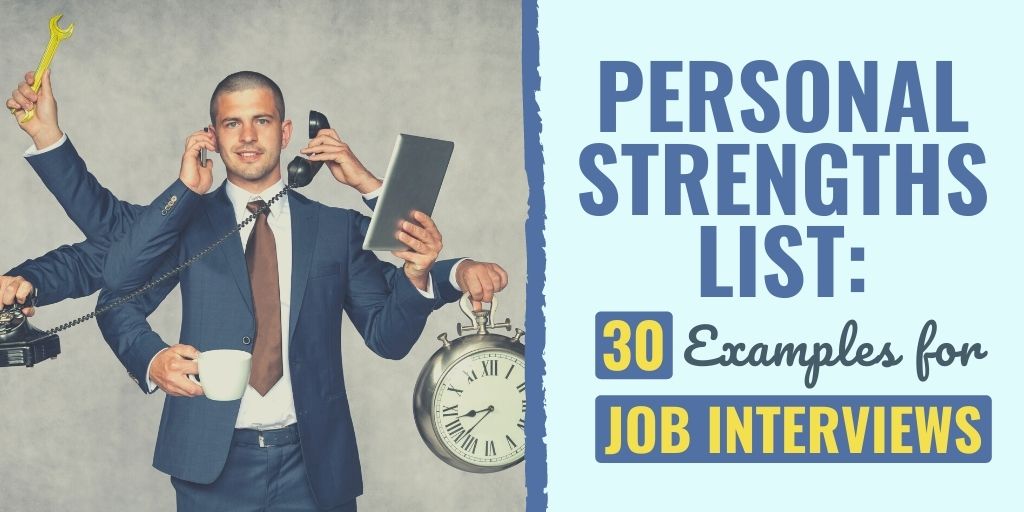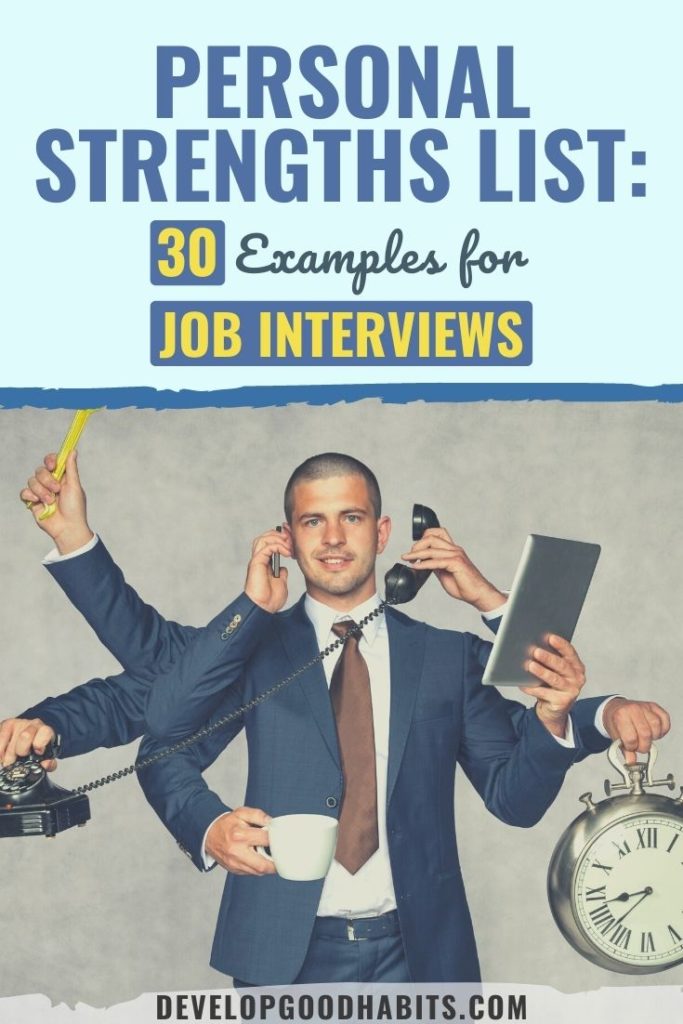Are you having trouble landing a job and starting to lose confidence? Or maybe you just hit the job market but want to get hired quickly.
Either way, job hunting can be tricky, and you must attend job interviews equipped with the right tools to impress your prospective employer.
One thing I have learned, both as an interviewer and an interviewee, is that job applicants must sell themselves.
And, unless you work in sales, this idea can be intimidating.
While you don’t want to sound conceited—and indeed not desperate—you want to be able to communicate to the people interviewing you how you can be an asset to their team.
So, how do you do this while still making a great first impression?
You need to know what your personal strengths are and how they align with the job description at hand.
It sounds more challenging to figure this out than it is. The first thing you need to do to identify your strengths is to think about things you have done in the past. What are some achievements you have made, and where have you excelled?
Make sure the strengths you come up with are relevant and adaptable to the job. Be sure to come prepared with a few examples of how you have applied that strength in the past and how it benefited your previous employer.
Learning how to promote yourself is simple once you do the self-reflection needed to uncover your personal strengths. (If you're not sure how to identify what makes you great, here is a five-step process for finding your strengths.)
In this post, I will give you 30 examples of what many employers are looking for when it comes to their potential employees’ personal strengths. Hopefully, you can see several of these strengths in yourself and highlight them in your interview to land the job offer that you’re looking for.
1. Strong Communication Skills
This strength is perhaps the most basic skill that employers look for, but the phrase “strong communication skills” is used so often that it is often unclear what it really means.
Strong communication skills mean that you can effectively and efficiently convey information through various mediums, including email, verbal, phone messages, and body language.
Strong communication also involves understanding instructions, making requests, and asking questions with ease. One reason employers look to hire people with strong communication skills is that they know that proper communication can not only bridge gaps but also mend negative situations.
If this is an area where you struggle, here are 11 ways you can improve your interpersonal communication skills.
2. Problem Solving Skills
Companies want to hire motivated employees who can take on challenges with little direction. Problem-solving is identifying things that could be improved and developing a plan to implement a change. It also involves observing the impact of those changes once they’re made.
Being able to problem-solve is crucial for you as an employee because it enables you to exert control over your environment. Problem-solving also helps you implement changes and improvements that organizations need to compete and survive in our ever-changing environment.
If you can have a solid brainstorming session and come up with solutions to the organization's problems, you will be a huge asset to the team.
3. Computer Literacy
Computer literacy is considered an important skill because most companies depend on computers and technology to accomplish their work.
Employers often use computers to help their company run more efficiently, which leads to lower costs. Having computer skills means you can perform tasks that other candidates may not be able to do.

For example, Microsoft Excel is arguably one of the most commonly used (yet misunderstood) computer programs. Being literate in creating Excel spreadsheets and knowing the formulas to input data into this program is a strength that can be useful in almost any career.
Plus, while you might think that since Excel has been around for 30+ years, most people know how to use it, studies have shown that 60% of people between the ages of 16 and 34 can't do basic spreadsheet tasks such as sorting or searching for data.
4. Leadership Skills
Good leadership skills mean you are more likely to be proactive and have a good sense of initiative. This will suggest to a potential employer that you don’t wait for others to tell you what needs to be done.
Because you are a forward-thinker, you are better prepared to offer solutions to problems that arise, be productive, and help motivate others without being told to do so.
5. Fast Learner
It doesn’t matter if you aren’t coming to an interview fully equipped with all the knowledge, skills, and abilities an employer is looking for as long as you can quickly pick up on new things. It’s okay if you’ve never done some of the things listed in the job description. Just be honest, then let them know you’re a fast learner.
Having the strength of being a fast learner will show employers that they won’t have to invest a lot of time or money into your training, which is a huge advantage.
6. Multi-tasker
“Multi-tasking” is sort of a buzzword in the business world, but it is an important strength nonetheless. Organizations require people to do more assignments and take on more responsibilities than ever before to keep up with their competitors.
While multitasking should have boundaries in the sense that you still need to be able to effectively perform all of the tasks you’re doing, it is still a highly sought-after skill.
All that said, if you want actually to increase productivity, read about the five reasons you should avoid the multitasking habit.
7. A Positive Mindset
Employees who come to work with a positive attitude and who are ready to greet their co-workers and clients with a smile are a great asset to an organization. You can sell this intangible strength in your interview by talking about a situation in a past job where your positivity helped the team succeed or how it was able to benefit the organization in some way.
Employers know that as the attitudes of their employees go up, so does the team’s potential. Also, they will know that your positive attitude can help you cope with stressful circumstances at work.
While this may seem more like a personality trait than a strength, it certainly takes a sense of personal strength to leave your problems at home when you get to work and remain positive throughout the day.
8. Self-Discipline
When you are self-disciplined, you have control over yourself and your actions. This is a valuable strength to a prospective employer because it means you follow through with your promises and decisions, achieving your goals and contributing to the progress of the organization’s goals.
Self-discipline also exhibits itself as inner strength, which helps you avoid procrastination or slacking on the job.
9. Emotional Intelligence
Your emotional intelligence (EI) is a significant factor in your professional interactions, and studies have shown that EI is a strong predictor of one’s job performance. EI is your ability to understand and manage your emotions and relationships effectively. If one of your strengths is EI, it means that you can stay calm under pressure, effectively resolve conflicts, be empathetic to co-workers, and lead by example.

Alternatively, when employees have low EI, organizations produce inferior outcomes because negative emotions spiral out of control. This may lead to unmet business goals, decreased productivity, increased absenteeism, and a high turnover rate.
And if you'd like to build this personal strength, here is a 7-step process for improving your emotional intelligence.
10. Organizational Skills
Organizational skills are some of an employee's most transferable job skills. When you’re organized, you can plan, prioritize, and keep track of your work.
The ability to keep your work systematic allows you to focus on a variety of projects while staying productive and efficient, which helps keep the business running smoothly and successfully.
Employers want to hire people who can not only maintain an organized work area but also quickly adjust to their company's organized structure.
11. Independent Thinker
Some people agree with everything their boss says without questioning it. However, companies need employees who will challenge the norm if their ideas could improve the business.
Standing up for what you think is the best thing for the company is a strength employers want, as it could mean that new ideas will be brought to the table.
12. Strong Work Ethic
Employers look for candidates with a strong work ethic because they want people who are willing to take the initiative and go above and beyond the call of duty to get the job done.
Successful employees are known for their strong work ethic and for being able to carry out the everyday tasks required to consistently reach their goals.
A strong work ethic certainly involves determination, but it is also about respect, honesty, and a growth mindset.
Employers get to decide what kind of work ethic they want in their employees and then adopt those behaviors to set the precedent for the organization.
13. Passion for the Field
You have to be passionate about the work you are interviewing for to sell yourself to potential employers. If you are apathetic toward the company's work, the hiring managers will be in no rush to bring you on board, as they will assume you will get by doing the bare minimum to get a paycheck.
Organizations want to hire people who love the industry and are interested in the company's well-being.
14. Credibility
Your credibility is made up of your character and reputation. While your interviewers may not gain any insight into your reputation until they call your references, they can get an idea of your character during the interview when they ask about how you have handled situations in the past.
Ensure that everything you say meets the highest ethical standards (without stretching the truth). You don’t want to say anything that could be misconstrued as anything other than ideal professional conduct and behavior.
15. Competence
Aside from being able to speak intelligently about the tasks required to do the job you are interviewing for, it is a good idea to show your interviewers that you are continually working to upgrade your level of competence in your work area through personal research.

Professional development is a massive part of organizations. If you can show a potential employer that you take the initiative to stay updated in your field during your time, it will show ongoing commitment.
16. Intelligence
Studies have shown that their level of intelligence determines 76% of an employee’s productivity and contribution.
Here, “intelligence” refers to your level of common sense and your ability to handle the everyday challenges that come with the job.
To demonstrate your intelligence in your interview, ask intelligent questions. The more curious you are and interested in hearing the answers, the brighter you’ll appear.
17. Integrity
Integrity starts with being true to yourself. You must be able to admit your weaknesses and strengths, and you must be willing to take responsibility for past mistakes.
When you have integrity, you have an innate tendency to do what is right and reject what is wrong despite the consequences that may come from your decisions.
Studies have shown that dishonesty (such as plagiarism) can lead to workplace deviance and white-collar crime, so employers clearly want to hire people who have a sense of integrity.
Integrity can take many forms, but in the workplace, the most important traits are dependability, honesty, and good judgment. This means that you act according to what you say, you’re reliable, your behaviors reflect your positive values, and you are eager to show that you care.
18. Team Player
Most organizations require some type of team collaboration, so having a strong suit for teamwork is a plus. Employers appreciate those who can support their team with a unified approach and work effectively with others.
Organizations want to hire employees who can work in unison despite differences in culture, personality, or work style.
19. Professionalism
Companies want to know that their employees will act professionally, especially if they are dealing directly with customers or clients.
Despite its importance, professionalism is undoubtedly not a skill everyone brings to the table, so you can set yourself apart from the competition by sticking to a professional code of conduct.
Many things go into acting professionally, but being aware of how your work and behavior affect those around you and being accountable for your actions are two significant components of it.
20. Flexibility
Being able to be flexible means you are willing and able to adapt to changing circumstances and expectations.
Flexible employees are valuable to employers because they are typically not those who say things like “that’s not my job” when asked to take on additional work.
Flexible employees can adjust their task approach based on each situation’s unique demands.
When employers hire people who are willing to take on extra responsibilities or who can adapt to changing conditions, they can accomplish more without having to find other people to take on additional work.
21. Creativity
Being creative can help you in any profession. The ability to develop unique ideas will impress your potential employer because companies rely on innovation to keep them ahead of the competition.
If you have that creative edge that will help you increase your work’s productivity or land new clients, interviewers will be impressed and excited to bring something new and unique to their company.

Do some research ahead of time about the organization to see if you can think of any new ideas to bring to the interview. Chances are, they will be impressed even if they don’t want to use the concept.
22. Loyalty
Employers want loyal employees. To show you are faithful in an interview, avoid negative comments about any previous employers or anyone you have worked with.
Even if you have been laid off or fired from a job, avoid criticizing the company and focus on the positive aspects of your experience.
Employers are looking to hire loyal people because these employees work hard for their money and are committed to the company’s success. They’re often willing to put the company’s best interests ahead of their own and constantly work to improve themselves in their roles.
Recent studies have shown that employees are beginning to define “loyalty” differently than they once did. While being loyal to a company used to suggest an employee would work for the company for a long time, now employees tend to be loyal to their role, but not necessarily the company.
Because feeling a sense of loyalty to an organization is rare, employers will jump at the chance to hire someone they believe has staying power.
23. Time Management
Time management skills allow you to properly prioritize your work, estimate how long each task will take, and complete your work in an orderly fashion so you can finish more tasks in a shorter period. This helps open up more free time, giving you opportunities to do more projects, engage in learning opportunities, reduce stress, or increase your focus.
All of these things lead to a more successful career.
Hiring managers want employees with good time management skills so they don’t waste the company’s time during work hours, which ultimately costs the company unnecessary money.
And if you'd like to improve your time management skills, here are a few articles that can help:
- The Eisenhower Matrix: How to Use 4 Quadrants to Make Important vs. Urgent Decisions in Your Life
- The 80/20 Rule: How to Apply This Principle to All Areas of Your Life
- 26 Productivity Hacks to Work Smarter, Not Harder
24. Ability to Accept Criticism
Receiving constructive criticism at work is helpful because it shows that your managers and co-workers care about your work and want you to succeed.
However, hearing negative feedback can be challenging for some people, and it may cause them to become defensive or offended.
Having the ability to accept criticism and view it as someone else genuinely trying to reach out to help you is a strength that shows your potential employer that you are open to learning new things and always want to have a chance to improve.
To develop this personal strength, here is a 7-step process to learn how to handle criticism effectively.
25. Research and Data Analysis
Compiling a lot of information or data and seeing the big picture is a critical strength to have in any job. It means that you can pick up on trends with the data you have and you’re willing to go out and find any information you don’t have.
Also, once you gather new material from your research, you can put it all together to see the big picture. Analytical skills are essential to employers because they show that you can find solutions to problems and make decisions based on past results on what actions to take next.
26. Attention to Detail

This strength is often mentioned but not necessarily wholly thought through.
You may wonder how one strength can be so crucial across so many different lines of work, but the answer is simple. Mistakes are bad for any organization.
Attention to detail can help you identify and solve problems, especially smaller issues that aren’t immediately recognized. As employers know, small mistakes can lead to major consequences.
Employers want to hire people who can get things right the first time.
27. Active Listening
Active listening is an increasingly valuable skill in the job market today, as people are easily distracted when they’re in the middle of a conversation.
Active listening is the process by which you gather information from another person but it is different from just hearing what a person is saying. It involves avoiding interrupting the other person, summarizing and repeating what you heard to ensure you correctly understand what they’re saying, and mirroring their body language to make them feel even more understood.
Active listening is a helpful strength for employees to have because it helps them absorb and truly understand what others are saying rather than only hearing what they want to hear or misinterpreting their words.
During a job interview, using active listening skills can help you build rapport with the interviewers.
28. Self-Awareness
This personal strength does not get the attention that it deserves. The greatest employees know themselves well enough to speak honestly, admit to their mistakes, and understand who they are and how they relate to their environment or surroundings.
When you are self-aware, you know how to manage your strengths and weaknesses in the workplace.
Having self-awareness allows you to relate better to co-workers, creating a more friendly environment.
You can objectively look at any problems that arise and your potential role in creating them.
You are also mindful of the people around you and their workspace. This means you aren’t making loud phone calls at your desk when others are trying to concentrate. Or you’re not disrupting co-workers with off-subject conversations when they’re trying to focus.
Having self-awareness dramatically contributes to a team’s efficiency.
29. Fast Decision Maker
Employers want to hire people who are ready to make a decision when it is time to do so, no matter how difficult it may be.
Being able to analyze a situation quickly and make a decision using only the information you have is a skill that will show employers that you are confident in your judgment.
30. Resilience
People who are easily able to bounce back from failure will impress an employer.
If you can prove you are resilient, potential employers will see that you know how to handle rejection, view problems as challenges, and be optimistic.
If you have a setback at your job, you will stand back up and continue to work hard for the company, which is a big-time and money-saver for employers.
Final Thoughts on Personal Strengths
While it can feel awkward to brag about your strengths, qualities, and abilities, it is important to highlight these soft and hard skills during a job interview to “sell” yourself to a prospective employer.
Don’t downplay the things you can do–and if you aren’t sure what your strengths are, ask a former co-worker or boss. They can tell you what they value in your work the most.
As you go through this list of personal strengths, think about some instances in your professional life where you displayed these qualities and it paid off. Bring these examples to your interview to share with the organization so they will see the value in hiring you.
Now you'd like a few resources that can teach you all the personal strengths on this page, then I recommend checking out these platforms to learn any skill.
- Masterclass (You can read the review of it here.)
- Skillshare (You can read the review of it here.)
- Udemy (You can read the review of it here.)
- Coursera (You can read the review of it here.)
Discover More Posts about Leaving or Finding Your Job:
Finally, if you want to take your goal-setting efforts to the next level, check out this FREE printable worksheet and a step-by-step process that will help you set effective SMART goals.

Connie Stemmle is a professional editor, freelance writer, and ghostwriter. She holds a BS in Marketing and a Master’s Degree in Social Work. When she is not writing, Connie is either spending time with her 4-year-old daughter, running, or making efforts in her community to promote social justice.


